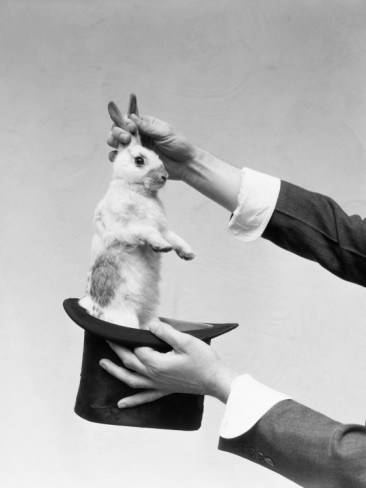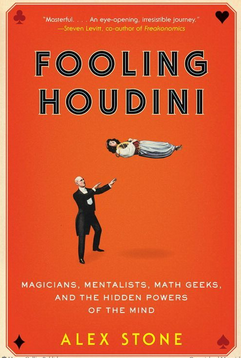Yesterday I confessed my fear of magicians. Today I confront that fear by going to the source: Alex Stone, a magician I met at a party who, at my prompting, was kind enough to perform an impromptu set that thrilled me but that also, on the walk home, left me feeling uneasy. I later learned that Alex is the author of Fooling Houdini: Magicians, Mentalists, Math Geeks, and the Hidden Powers of the Mind, a book that explains some of the hard-wiring behind the brain’s susceptibility to illusions.

Richard: Magicians scare me because they can manipulate my mind. Should I be scared? Or can you reassure me?
Alex: I don’t know how much reassurance I can offer you, given what I know about magicians. It makes sense, though. Magicians are experts in deception and lying. Some of them—most of them—do it to entertain people and make them happy. But many of the same techniques magicians use to manipulate people’s minds can also be used for more nefarious purposes, and have been. Magic also reminds us of how easy we are to fool, which is amusing but, as you noted, kind of scary, too.
Richard: You write about the neurological basis behind certain illusions—inattentional blindness, for example. You yourself helped design an experiment based on tactile insensitivity, a sort of sense-of-touch “blindness.” How reliable are these scientific principles in executing magic—that is, in fooling us dupes in the audience?
 Alex: I would say they are remarkably reliable, because magicians exploit them all the time and have been doing so since the earliest days of the craft. That said, not every trick is based on some sort of cognitive illusion. There are many ways to fool someone, and they don’t all involve inattentional blindness, say, or persistence of vision. With regard to tactile insensitivity, that was from a little experiment I did with Arien Mack, a pioneer in the field of the psychology of attention. For this experiment, I lured subjects into her lab, distracted them with a coin trick (which gave me an excuse to grab their wrists), and I took off their watches using sleight of hand.
Alex: I would say they are remarkably reliable, because magicians exploit them all the time and have been doing so since the earliest days of the craft. That said, not every trick is based on some sort of cognitive illusion. There are many ways to fool someone, and they don’t all involve inattentional blindness, say, or persistence of vision. With regard to tactile insensitivity, that was from a little experiment I did with Arien Mack, a pioneer in the field of the psychology of attention. For this experiment, I lured subjects into her lab, distracted them with a coin trick (which gave me an excuse to grab their wrists), and I took off their watches using sleight of hand.
Richard: Right. I mentioned in my post yesterday that this trick was played on me by a magician who was performing at a dinner party. That incident has also contributed to my fear of magicians’ ability to manipulate me, especially after I’ve had a couple of glasses of wine. How common is my level of tactile insensitivity?
Alex: What we found was that only about one in five people noticed. Now, from a scientific standpoint, that’s not bad. But from a magician’s point of view, it’s terrible, because a trick that only works 80 percent of the time isn’t a good trick. However, these were particularly austere conditions, and quite frankly I’m not nearly as deft at stealing watches as a lot of magicians are. There are pros who specialize in this sort of thing and probably get burned one out of every hundred times, which is incredible when you think about it. The power of misdirection to blind us to the obvious—whether sights or sounds or tactile sensations—never ceases to amaze me. It works time and time again, on pretty much anyone, which is why it’s been the bedrock of magic for centuries.
Richard: Can these neurological illusions fool magicians who know what to look for?
Alex: Yes and no, but more yes than no. Sure, magicians know what to look for. But magicians know that! So good magicians will manipulate these assumptions and use it as a weapon to fool other magicians. That’s why you’ve got all these magic competitions, the most famous being the World Championships, often referred to as The Magic Olympics, where magicians get together and try to fool one another with original tricks and routines. The amazing thing is that no matter how expert these magicians are, there’s always someone out there who can fool them.
Richard: So you get fooled, too. Sucker!
Alex: Just the other day, I was at a talk and a neuroscientist showed the famous gorilla video. I immediately dismissed it, thinking, “Oh yeah I’ve seen this before. This is old hat.” But afterward it turned out that it was a twist on the original video. The gorilla was still there, but other changes took place as well: The background changed color, for instance, and one of the players left the scene. I was looking for the gorilla, so I missed all the other stuff going on in the scene! This is similar to what magicians do when they want to dupe one another. They manipulate expectations. Magicians are incredibly creative and are always coming up with ingenious new ways to fry each other. The field never gets stale—people are always pushing the envelope. I don’t care how much you know or think you know, there’s some kid out there with some new trick that will totally destroy you.
Richard: Do you ever find yourself worrying that even if you execute the trick flawlessly, the science behind it will fail you just this once?
Alex: Oh sure. Nothing is completely failsafe. All magicians get busted from time to time even if they do everything right. Which is why a big part of getting good at magic is learning how to handle these situations. It’s really important to learn “outs,” or alternate endings to tricks that get you out of tight spots, for instance. And this is something that really only comes with experience. That, or you just distract everyone while you run away as fast as you can.
I love this series! Thank you! (And I just remembered to re-read the NYer profile of Apollo Robbins, and found this video: http://www.newyorker.com/online/blogs/culture/2013/01/video-the-art-of-pickpocketing.html)–I didn’t think I would like knowing how some of these things were done, but it was delightful.
Thanks, Cameron. In Part I of this series, I started to write about whether knowing the secret diminishes the effect. My hunch is it probably enhances the experience, much like a reader knowing what makes a sentence sing, or a viewer appreciating the emotional resonance of a camera angle. Art is all about choices, and if you recognize that the artist made a spectacularly good one, the experience can be sublime.